|
 Secure Site
Secure Site
|
 |
Archive for the 'Japanese Inspired Zen Clocks' Category
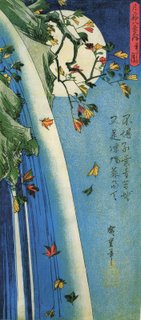 Hiroshige, The Moon Over A Waterfall - woodblock print
The sage has three treasures
simplicity
patience
compassion
-Basho
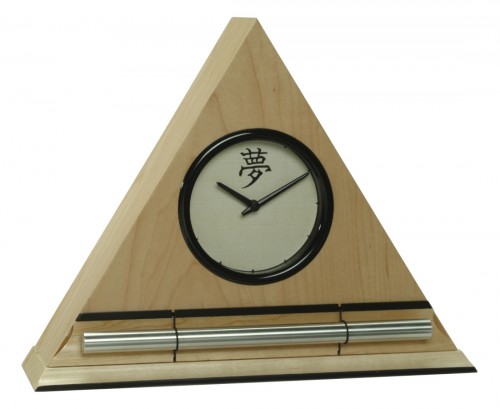 Maple Kanji Zen Alarm Clock, progressive chime alarm clock
Now & Zen
1638 Pearl Street
Boulder, CO 80302
Posted in Bamboo Chime Clocks, Chime Alarm Clocks, Japanese Inspired Zen Clocks, Japanese Poetry, Meditation Timers, Meditation Tools, Natural Awakening, Now & Zen Alarm Clocks, Yoga Timers by Now & Zen, Zen Timers
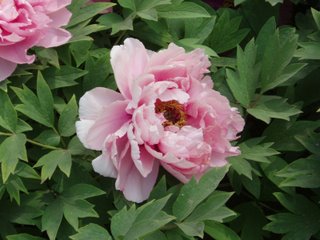 Paeonia Suffruticosa Peonies scattering,
two or three petals
lie on one another.
-buson-
 Zen Chime Clock with Maple Leaves in Honey Finish, progressive awakening clock
Now & Zen
1638 Pearl Street
Boulder, CO 80302
Posted in Bamboo Chime Clocks, Japanese Inspired Zen Clocks, Japanese Poetry, Meditation Timers, Meditation Tools, mindfulness practice, Natural Awakening, Now & Zen Alarm Clocks, Progressive Awakening, Yoga Timer, Zen Timepiece by Now & Zen
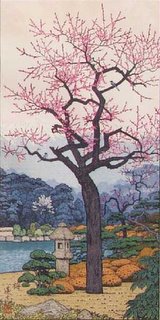 Yoshida, "Plum" woodblock print Moon, plum blossoms,
this, that,
and the day goes.
-Issa-
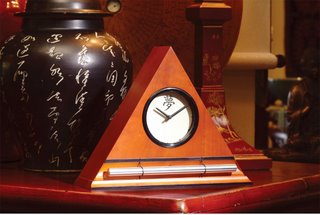 Zen Alarm Clock with Chime and Dream Kanji Dial Face
Now & Zen
1638 Pearl Street
Boulder, CO 80302
Posted in Chime Alarm Clocks, Japanese Inspired Zen Clocks, Meditation Tools, mindfulness practice, Natural Awakening, Now & Zen Alarm Clocks, Progressive Awakening, Well-being, Yoga Timer, Zen Timers
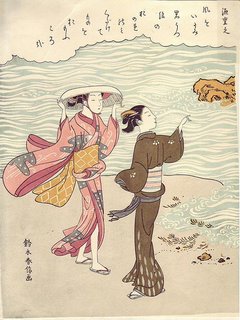 Ocean Women Ukiyo-e by Suzuki Harunobu Suzuki Harunobu (1724 – 1770) was a Japanese woodblock print artist, one of the most famous in the Ukiyo-e style. He was an innovator, the first to produce full-color prints (nishiki-e) in 1765, rendering obsolete the former modes of two- and three-color prints. Harunobu used many special techniques, and depicted a wide variety of subjects, from classical poems to contemporary beauties.
adapted from wikipedia.org
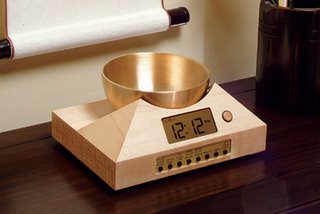 Timer for meditation by Now & Zen Inc.
Now & Zen
1638 Pearl St.
Boulder, CO 80302
Posted in Bamboo Chime Clocks, Japanese Inspired Zen Clocks, Progressive Awakening, Ukiyo-e, Yoga Timers by Now & Zen
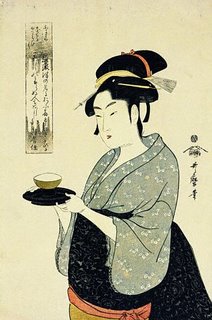 Kitagawa Utamaro Ukiyo-e, wabi-cha Wabi-cha, or wabi-tea, is a style of Japanese Tea Ceremony particularly associated with Sen no Rikyu and Takeno Joo before him. Wabi-cha emphasizes simplicity. The term came into use in the Edo era (1603 to 1868), prior to which it was known as wabi-suki, suki generally referring to the concept of “artistic inclination,” and “wabi” literally meaning ‘forelorn’.
adapted from wikipedia.org
 Zen Chime Clock with Japanese Maple Leaves in Honey Finish Now & Zen
1638 Pearl St.
Boulder, CO 80302
Posted in Bamboo Chime Clocks, Chime Alarm Clocks, Japanese Inspired Zen Clocks, Meditation Timers, Meditation Tools, mindfulness practice, Natural Awakening, Now & Zen Alarm Clocks, Progressive Awakening, Yoga Timer, Yoga Timers by Now & Zen, Zen Timers
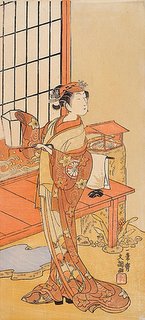 Ukiyo-e by Ippitsusai Buncho of the actor Segawa Kikunojo Iki is a traditional aesthetic ideal in Japan. Iki, having emerged from the worldly Japanese merchant class, may appear in some ways a more contemporary expression of Japanese aesthetics than concepts such as wabi-sabi. The term is commonly used in conversation and writing, but is not necessarily exclusive of other categories of beauty.
Iki is an expression of simplicity, sophistication, spontaneity, and originality. It is ephemeral, romantic, straight forward, measured, audacious, smart, and unselfconscious.
Iki is not overly refined, pretentious, complicated, showy, slick, coquettish, or, generally, cute. At the same time, iki may exhibit any of those traits in a smart, direct, and unabashed manner.
Iki may signify a personal trait, or artificial phenomena exhibiting human will or consciousness.
Iki is not used to describe natural phenomena, but may be expressed in human appreciation of natural beauty, or in the nature of human beings.
Murakami Haruki (b.1949), who writes in a clear, unflinching style–at turns sentimental, fantastic, and surreal–is described as embodying iki. In contrast, Kawabata Yasunari (1899-1972) writes in a more poetic vein, with a closer focus on the interior “complex” of his characters, while situations and surroundings exhibit a kind of wabi-sabi. That said, stylistic differences may tend to distract from a similar emotional subjectivity. Indeed, iki is strongly tied to stylistic tendencies.
adapted from wikipedia.org
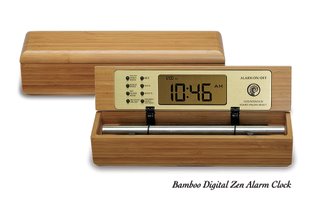 Bamboo Digital Chime Clock, for a progressive awakening
Now & Zen
1638 Pearl Street
Boulder, CO 80302
Posted in Bamboo Chime Clocks, Japanese Inspired Zen Clocks, Meditation Timers, Meditation Tools, mindfulness practice, Natural Awakening, Progressive Awakening, Zen Timers
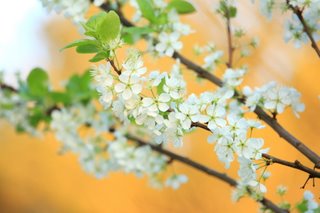 plum blossoms, one of the four noble gentlemen The “Four Gentlemen”, also called the Four Noble Ones or Four Friends, in Chinese art refers to four plants: the orchid, or ran; the bamboo; the chrysanthemum, or kiku; and the plum blossom, or ume (italics are in Japanese). The term compares the four plants to Confucianist junzi, or “gentlemen”. A painting or decoration incorporating all four plants is also known as the “Four Gentlemen”. They are most typically depicted in traditional ink and wash painting. The “Four Gentlemen” belong to the category of bird-and-flower painting in Chinese art.
The Four Gentlemen have been used in Chinese painting since the time of the Chinese Song Dynasty (960–1279) because of their refined beauty, and were later adopted by artists in Korea, Japan, and Vietnam. As they represent the four different seasons (the plum blossom for winter, the orchid for spring, the Chrysanthemum for autumn, and the bamboo for summer), the four are used to depict the unfolding of the seasons through the year.
adapted from wikipedia.org
 Zen Alarm Clock with Chime and Dream Kanji Dial Face Now & Zen
1638 Pearl Street
Boulder, CO 80302
Posted in Bamboo Chime Clocks, Chime Alarm Clocks, Japanese Inspired Zen Clocks, Meditation Tools, mindfulness practice, Natural Awakening, Now & Zen Alarm Clocks
« Previous Page — « Previous Entries
Next Entries » — Next Page »
|
|
|
|